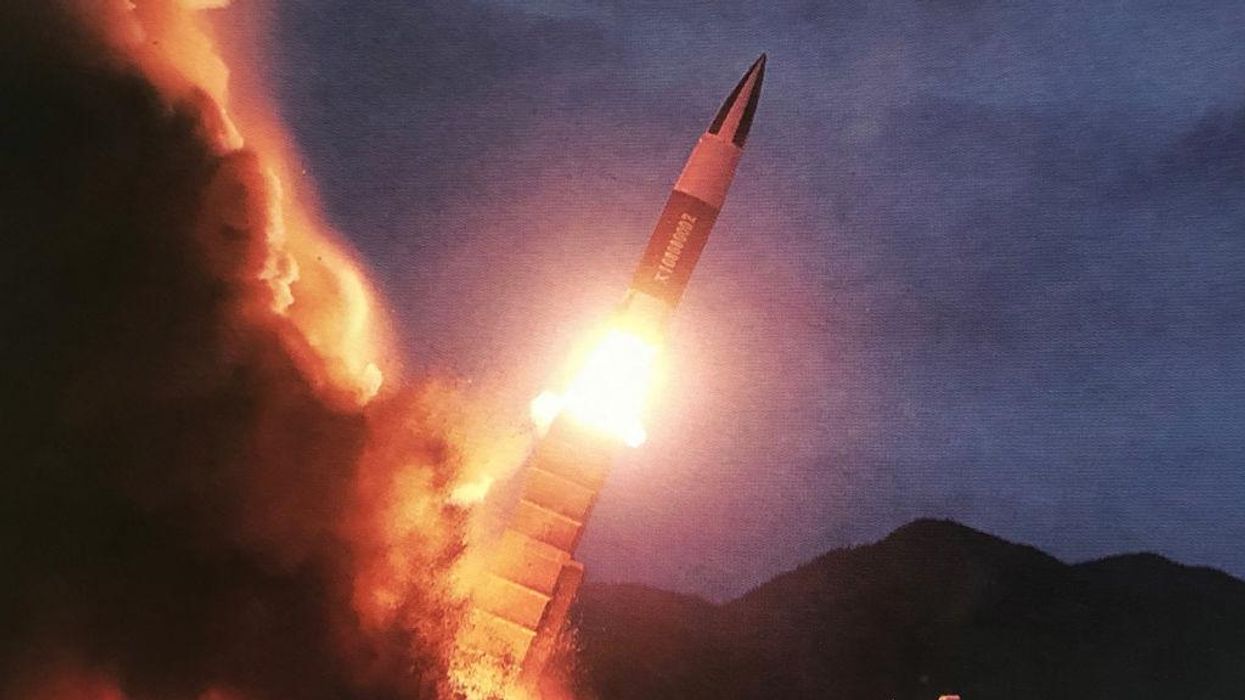
Photo by API/Gamma-Rapho via Getty Images

On October 3, just days after Vice President Kamala Harris' visit to the Korean Peninsula's Demilitarized Zone, North Korea fired a ballistic missile over Japan — the first time it has done so in five years.
The missile, believed to be the Hwasong-12, proved capable of reaching Guam. It was airborne for 20 minutes, reached an altitude of 620 miles (over twice as high as the International Space Station) and ultimately traveled 2,800 miles before smashing into the Pacific Ocean.
Upon detecting the launch, Japanese officials halted trains in the northern Hokkaido and Aomori regions and urged citizens to take shelter.
Japanese Prime Minister Fumio Kishida's office indicated that a missile was "believed to have been launched from North Korea" and that citizens should "evacuate to the inside of a building or go to the basement."
\u201cBREAKING: Air raid sirens sounding in Japan following reports of North Korea missile fire, missile reportedly overflew the country and landed into Pacific Ocean\u201d— Insider Paper (@Insider Paper) 1664838074
The U.S. Embassy in Tokyo reportedly cautioned Americans in the area that there was a possibility the missile was headed toward Japan.
Later, Japanese officials acknowledged that "the aforementioned missile is believed to have passed through the Pacific Ocean."
The U.S., Japanese, and South Korean governments quickly condemned the attacks.
Kishida stated that the "firing, which followed a recent series of launches by North Korea, is a reckless act and I strongly condemn it."
The Japanese prime minister was referencing several earlier launches of short-range ballistic missiles by the communist regime into the East Sea, including two fired just hours after the U.S. vice president's departure from South Korea last week.
South Korean President Yoon Suk-yeol indicated that the regime's "reckless nuclear provocations" would be met by a stern response.
Adrienne Watson, the spokesman for the U.S. National Security Council, stated that "the United States strongly condemns the Democratic People's Republic of Korea's (DPRK) dangerous and reckless decision to launch a long-range missile over Japan."
Watson added that the act was "destabilizing" to the region and in contravention of United Nations Security Council resolutions.
The Security Council previously called on the communist regime to "cease its illicit activity" and voted 15-0 to sanction the rogue nation.
In response to the imposition of parallel U.S. sanctions against North Korea in 2017, Pyongyang responded: "The U.S. mainland will sink into an unimaginable sea of fire on the day when it dares to touch our country by stupidly causing mischief and brandishing its nuclear and sanctions clubs."
The regime also threatened to hit U.S. military bases in Guam with the same type of missile believed to have been fired this week.
Responding to these threats to the U.S. homeland in a speech to the U.N., on September 19, 2017, former President Donald Trump stated: "The United States has great strength and patience, but if it is forced to defend itself or its allies, we will have no choice but to totally destroy North Korea."
North Korea withdrew from the nuclear Non-Proliferation Treaty in 2003, after the U.S. alleged the regime was pursuing an illegal uranium enrichment program. It refuses to return to nuclear diplomacy with the U.S.
This latest missile launch is reportedly another step toward the regime's test of a nuclear weapon, expected to occur after China's communist party congress starting on October 16.
Adrienne Watson emphasized that the U.S. "will continue its efforts to limit [North Korea's] ability to advance its prohibited ballistic missiles and weapons of mass destruction programs, including with allies and U.N. partners."
The U.S. and South Korea quickly responded to the communist regime's first missile launch with what the South Korean Joint Chiefs of Staff characterized as a "combined attack squadron flight and precision bombing drill."
Four U.S. F-16 fighter jets and four South Korean F-15s fired on an uninhabited island in the Yellow Sea. The drill evidenced the allies' ability to accurately obliterate communist targets with "overwhelming force" and "to respond resolutely to any provocation from North Korea."
Last week, the two countries also conducted joint military exercises, in which the U.S.S. Ronald Reagan participated. The North Korean regime allegedly regarded these exercises as invasion rehearsals.
On October 1, the 7th Fleet conducted exercises with Canada and Japan, reiterating its "commitment to a free and open Indo-Pacific."
In response to the latest missile launch, U.S. Indo-Pacific Command stated: "The United States condemns these actions and calls on the DPRK to refrain from further unlawful and destabilizing acts," noting further that while "the event does not pose a threat to U.S. personnel, or territory, or to our allies, we will continue to monitor the situation."
\u201c.@INDOPACOM's statement on #DPRK's most recent missile launch\n\ud83d\udd0e https://t.co/X2NwCs7dTu\u00a0\u00a0\n\n#\uac19\uc774\uac11\uc2dc\ub2e4 | \ud83c\uddf0\ud83c\uddf7 #ROKUSAlliance \ud83c\uddfa\ud83c\uddf8 | #WeGoTogether\n@ROK_MND | @DeptofDefense | @USForcesJapan\u201d— U.S. Forces Korea (@U.S. Forces Korea) 1664860744
USINDOPACOM added that the "U.S. commitments to the defense of Japan and the [Republic of Korea] remain ironclad."